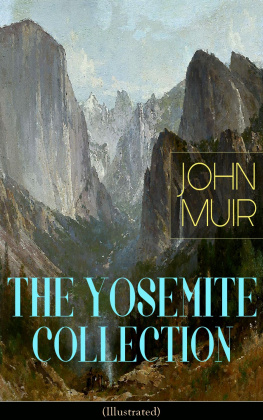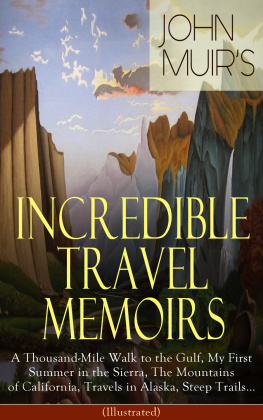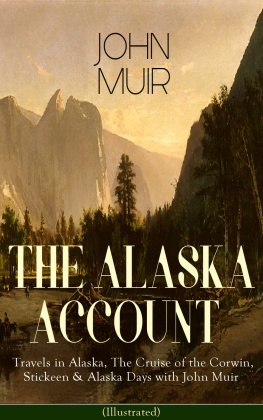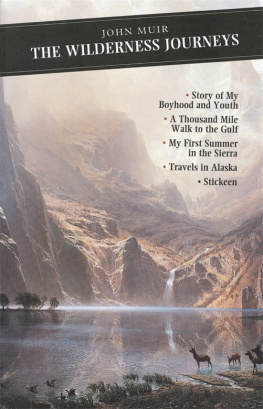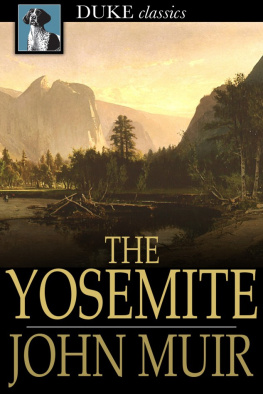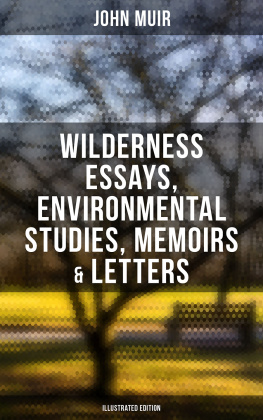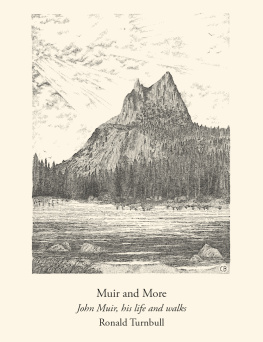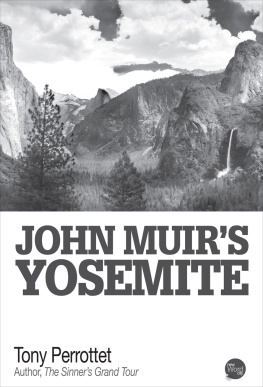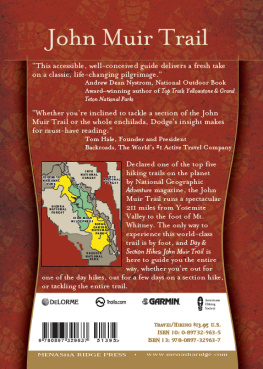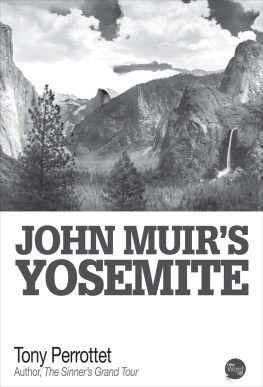John Muir - THE YOSEMITE COLLECTION of John Muir (Illustrated)
Here you can read online John Muir - THE YOSEMITE COLLECTION of John Muir (Illustrated) full text of the book (entire story) in english for free. Download pdf and epub, get meaning, cover and reviews about this ebook. publisher: e-artnow, genre: Home and family. Description of the work, (preface) as well as reviews are available. Best literature library LitArk.com created for fans of good reading and offers a wide selection of genres:
Romance novel
Science fiction
Adventure
Detective
Science
History
Home and family
Prose
Art
Politics
Computer
Non-fiction
Religion
Business
Children
Humor
Choose a favorite category and find really read worthwhile books. Enjoy immersion in the world of imagination, feel the emotions of the characters or learn something new for yourself, make an fascinating discovery.
- Book:THE YOSEMITE COLLECTION of John Muir (Illustrated)
- Author:
- Publisher:e-artnow
- Genre:
- Rating:4 / 5
- Favourites:Add to favourites
- Your mark:
- 80
- 1
- 2
- 3
- 4
- 5
THE YOSEMITE COLLECTION of John Muir (Illustrated): summary, description and annotation
We offer to read an annotation, description, summary or preface (depends on what the author of the book "THE YOSEMITE COLLECTION of John Muir (Illustrated)" wrote himself). If you haven't found the necessary information about the book — write in the comments, we will try to find it.
THE YOSEMITE COLLECTION of John Muir (Illustrated) — read online for free the complete book (whole text) full work
Below is the text of the book, divided by pages. System saving the place of the last page read, allows you to conveniently read the book "THE YOSEMITE COLLECTION of John Muir (Illustrated)" online for free, without having to search again every time where you left off. Put a bookmark, and you can go to the page where you finished reading at any time.
Font size:
Interval:
Bookmark:
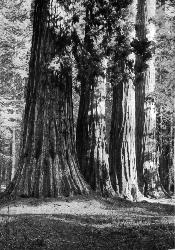
Sequoias, Mariposa Grove
TO
CHARLES SPRAGUE SARGENT
STEADFAST LOVER AND DEFENDER
OF OUR COUNTRY'S FORESTS
THIS LITTLE BOOK
Is Affectionately Dedicated.
In this book, made up of sketches first published in the Atlantic Monthly, I have done the best I could to show forth the beauty, grandeur, and all-embracing usefulness of our wild mountain forest reservations and parks, with a view to inciting the people to come and enjoy them, and get them into their hearts, that so at length their preservation and right use might be made sure.
Martinez, California
September, 1901
The Wild Parks and Forest Reservations of the West
"Keep not standing fix'd and rooted,
Briskly venture, briskly roam;
Head and hand, where'er thou foot it,
And stout heart are still at home.
In each land the sun does visit
We are gay, whate'er betide:
To give room for wandering is it
That the world was made so wide."
The tendency nowadays to wander in wildernesses is delightful to see. Thousands of tired, nerve-shaken, over-civilized people are beginning to find out that going to the mountains is going home; that wildness is a necessity; and that mountain parks and reservations are useful not only as fountains of timber and irrigating rivers, but as fountains of life. Awakening from the stupefying effects of the vice of over-industry and the deadly apathy of luxury, they are trying as best they can to mix and enrich their own little ongoings with those of Nature, and to get rid of rust and disease. Briskly venturing and roaming, some are washing off sins and cobweb cares of the devil's spinning in all-day storms on mountains; sauntering in rosiny pinewoods or in gentian meadows, brushing through chaparral, bending down and parting sweet, flowery sprays; tracing rivers to their sources, getting in touch with the nerves of Mother Earth; jumping from rock to rock, feeling the life of them, learning the songs of them, panting in whole-souled exercise, and rejoicing in deep, long-drawn breaths of pure wildness. This is fine and natural and full of promise. So also is the growing interest in the care and preservation of forests and wild places in general, and in the half wild parks and gardens of towns. Even the scenery habit in its most artificial forms, mixed with spectacles, silliness, and kodaks; its devotees arrayed more gorgeously than scarlet tanagers, frightening the wild game with red umbrellas,--even this is encouraging, and may well be regarded as a hopeful sign of the times.

Map showing location and extent of the Forest Reserves & National Parks in western United States to 3rd, August, 1901.
All the Western mountains are still rich in wildness, and by means of good roads are being brought nearer civilization every year. To the sane and free it will hardly seem necessary to cross the continent in search of wild beauty, however easy the way, for they find it in abundance wherever they chance to be. Like Thoreau they see forests in orchards and patches of huckleberry brush, and oceans in ponds and drops of dew. Few in these hot, dim, strenuous times are quite sane or free; choked with care like clocks full of dust, laboriously doing so much good and making so much money,--or so little,--they are no longer good for themselves.
When, like a merchant taking a list of his goods, we take stock of our wildness, we are glad to see how much of even the most destructible kind is still unspoiled. Looking at our continent as scenery when it was all wild, lying between beautiful seas, the starry sky above it, the starry rocks beneath it, to compare its sides, the East and the West, would be like comparing the sides of a rainbow. But it is no longer equally beautiful. The rainbows of to-day are, I suppose, as bright as those that first spanned the sky; and some of our landscapes are growing more beautiful from year to year, notwithstanding the clearing, trampling work of civilization. New plants and animals are enriching woods and gardens, and many landscapes wholly new, with divine sculpture and architecture, are just now coming to the light of day as the mantling folds of creative glaciers are being withdrawn, and life in a thousand cheerful, beautiful forms is pushing into them, and new-born rivers are beginning to sing and shine in them. The old rivers, too, are growing longer, like healthy trees, gaining new branches and lakes as the residual glaciers at their highest sources on the mountains recede, while the rootlike branches in the flat deltas are at same time spreading farther and wider into the seas and making new lands.
Under the control of the vast mysterious forces of the interior of the earth all the continents and islands are slowly rising or sinking. Most of the mountains are diminishing in size under the wearing action of the weather, though a few are increasing in height and girth, especially the volcanic ones, as fresh floods of molten rocks are piled on their summits and spread in successive layers, like the wood-rings of trees, on their sides. New mountains, also, are being created from time to time as islands in lakes and seas, or as subordinate cones on the slopes of old ones, thus in some measure balancing the waste of old beauty with new. Man, too, is making many far-reaching changes. This most influential half animal, half angel is rapidly multiplying and spreading, covering the seas and lakes with ships, the land with huts, hotels, cathedrals, and clustered city shops and homes, so that soon, it would seem, we may have to go farther than Nansen to find a good sound solitude. None of Nature's landscapes are ugly so long as they are wild; and much, we can say comfortingly, must always be in great part wild, particularly the sea and the sky, the floods of light from the stars, and the warm, unspoilable heart of the earth, infinitely beautiful, though only dimly visible to the eye of imagination. The geysers, too, spouting from the hot underworld; the steady, long-lasting glaciers on the mountains, obedient only to the sun; Yosemite domes and the tremendous grandeur of rocky caons and mountains in general,--these must always be wild, for man can change them and mar them hardly more than can the butterflies that hover above them. But the continent's outer beauty is fast passing away, especially the plant part of it, the most destructible and most universally charming of all.
Only thirty years ago, the great Central Valley of California, five hundred miles long and fifty miles wide, was one bed of golden and purple flowers. Now it is ploughed and pastured out of existence, gone forever,--scarce a memory of it left in fence corners and along the bluffs of the streams. The gardens of the Sierra, also, and the noble forests in both the reserved and unreserved portions are sadly hacked and trampled, notwithstanding, the ruggedness of the topography,--all excepting those of the parks guarded by a few soldiers. In the noblest forests of the world, the ground, once divinely beautiful, is desolate and repulsive, like a face ravaged by disease. This is true also of many other Pacific Coast and Rocky Mountain valleys and forests. The same fate, sooner or later, is awaiting them all, unless awakening public opinion comes forward to stop it. Even the great deserts in Arizona, Nevada, Utah, and New Mexico, which offer so little to attract settlers, and which a few years ago pioneers were afraid of, as places of desolation and death, are now taken as pastures at the rate of one or two square miles per cow, and of course their plant treasures are passing away,--the delicate abronias, phloxes, gilias, etc. Only a few of the bitter, thorny, unbitable shrubs are left, and the sturdy cactuses that defend themselves with bayonets and spears.
Font size:
Interval:
Bookmark:
Similar books «THE YOSEMITE COLLECTION of John Muir (Illustrated)»
Look at similar books to THE YOSEMITE COLLECTION of John Muir (Illustrated). We have selected literature similar in name and meaning in the hope of providing readers with more options to find new, interesting, not yet read works.
Discussion, reviews of the book THE YOSEMITE COLLECTION of John Muir (Illustrated) and just readers' own opinions. Leave your comments, write what you think about the work, its meaning or the main characters. Specify what exactly you liked and what you didn't like, and why you think so.

